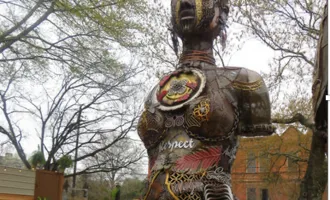
This Date in UCSF History: Supreme Court Decision Fails to Reflect Needs
Originally publishing on March 25, 1977. As the U.S. Supreme Court announced last week its decision to hear the Bakke case, organizations state-wide responded with rallies, forums and demonstrations protesting the California Supreme Court decision and its ramifications. A wide coalition of worker and student groups called for reversal of the Bakke decision and an end to the attacks on the affirmative action plans won in the ‘60s.
AREAP forum
At UCSF, the Alliance for Responsible Employment and Admissions Policies (AREAP) sponsored “The Bakke Decision - A Forum” on Feb. 23 attended by over 200 people. The forum was designed to educate people about the Bakke decision as an “essential part of the fight against admission and hiring policies which fail to reflect the needs of Third World people and women.”
Ahimsa Sumchai, AREAP spokesperson and forum moderator, opened the session with an explanation of the 1968 struggle which initially was responsible for the current admission policy.
Sumchai pointed out that the strike by Black employees in 1968 forced the University to change its admission and employment policies.
“Ten years later, in the face of a court decision that now legalizes our exclusion, we are bitterly obliged to consider the resurrection of once effective forces,” she said. “With responsible coercion, institutions such as this one must again be forced to formulate policies — with us, not for us — which will more equitably distribute jobs and health care to under-represented and misrepresented communities.”
Legal aspects
Charles Lawrence, professor of constitutional law at USF Law School, explained that Allan Bakke came to court because he felt he was denied equal protection under the 14th amendment, i.e., that he suffered from “reverse discrimination.”
But UC failed to challenge Bakke’s claim that he was more qualified based on criteria like MCAT scores and grade point average.
Lawrence rejected the assumption that Bakke was more qualified because UC admissions qualifications must be rationally related to why the medical school exists, to produce medical practitioners to serve all the state’s communities.
“Qualifications such as language, cultural experience, motivation and the commitment to serve a needy area would make Bakke less qualified than those applicants he claimed to surpass,” Lawrence said.
Classifications
Neutral classifications such as MCAT’s have non-neutral effects because these tests are culturally biased in their design and bear no direct correlation between scores and ability to be a doctor.
These “neutral classifications” are a form of d c facto discrimination; discrimination not explicitly stated but nonetheless insidiously present, he said.
Lawrence urged for the development of admissions criteria by UC which emphasize the special qualifications brought to medicine by people who share the cultural experiences of underserved communities.
Lawrence also stated that not only did the UC lawyers fail to challenge Bakke’s assertions on qualifications, but UC showed a suspicious if not definite complicity in the case.
Factors contributing to this she said, were: 1) Peter Storandt, Assistant Dean of Admissions at UC Davis, encouraged Bakke to sue, 2) UC failed to acknowledge its past discrimination in admissions policy and therefore closed one avenue of defense, 3) the Regents voted nearly unanimously (11-2) to appeal the case to the U.S. Supreme Court with full knowledge that their defense was weak.
He ended by reiterating Sumchai’s remark that the struggle will not be won in the courts but through “responsible coercion” from the people.
Historical
Angela Blackwell, a third-year law student at Boalt Hall, added to Dr. Lawrence’s discussion of the legal implications of the Bakke decision.
She stated that she saw the historical development of the Bakke decision in terms of the political, social and moral environment in which “Bakke” arose rather than as a strict case of law. Court decisions are often dictated by the political stance of its members.
She also explained how the real parties weren’t represented in court and therefore the only issues raised were those which could lead the court to its ultimate decision. UCSF admissions policies were then clearly delineated by Dr. Stan Padilla, a member of the admissions committee at UCSF.
Dr. Padilla is a member of Subcommittee Three which reviews applications from racially, socially and economically disadvantaged persons.
Due to changes in admission policies instituted last spring anticipating the unfavorable Bakke decision, this committee now reviews applications from whites and Asians who are economically disadvantaged.
This change allotted only 19 percent in additional positions but has resulted in a 45 percent increase in total applications to this subcommittee. Although Dr. Padilla predicted that the number of Third World acceptances would remain constant this year, he said that the increased competition between poor Asians, whites and minority students will lead to a greater decrease in the Third World enrollment in the future.
“Even a slight decrease in minority acceptance will result in a major hurt to community health care,” he said. “These recent changes in UC admission procedures, although addressing the legal threat to UC, does not address the need of Third World peoples and in fact, endangers the need.” Testing
Ed Chen, a member of the UC Task Force on Graduate and Professional Admissions, explained the development of standardized testing grew out of the “Social Darwinism” and eugenics movements of the late 19th and early 20th centuries.
He pointed out that Francis Galton, member of the eugenics movement, created the IQ test specifically to identify those people he considered “inferior.”
Today, these tests are used to track students early in their education into substandard educational opportunities.
He stated that one-third of Chicano children are tracked into “mentally retarded” classes because they can’t understand the language in which the tests are written.
Chen pointed out that the system of standardized testing is controlled solely by ETS (Educational Testing Service). ETS administers the SAT, GRE, LSAT, MCAT and the multi-state bar exam.
In asking “Who’s interest does this corporation represent,” Chen stated that ETS has pointed to their own racist policies by admitting that their tests underpredict Third World performance and must be supplemented by other criteria in evaluating those students.
One study by the Law School Admissions Council showed a higher correlation between LSAT score and race than between score and performance in law school.
“Thus,” Chen concluded, “these tests are more racist than predictive.”
Task force
In response to criticism about the legal defense of the Bakke case, UC’s President Saxon has instituted a task force to design alternative admissions programs.
In questioning the effectiveness of this approach, Chen pointed out that the committee has a four-month deadline with six scheduled meetings to perform this task.
The committee includes a few deans but no women, only four Third World representatives, and two students.
These two students, who make up half of the minority representation, were appointed after the committee was formed and only after pressure from student groups was exerted.
Tony Ragadio, a San Francisco dentist and a member of UCSF medical admission committee, spoke about the impact of the Bakke decision on the quality of health care in Third World communities.
He stated that the decision jeopardizes not only the health but the socioeconomic future of people of color.
He stressed that the ability to communicate and culturally understand one’s patients is a major factor in the quality of health care.
Even of committed white doctors can learn the language, they nonetheless fail to act as needed community leaders and role models, Dr. Bagadio concluded.
Karen Sham, a member of the AFSCME Affirmative Action Committee, reemphasized the role of Third World workers in establishing the 1968 guidelines for affirmative action and admissions policy.
All schools and departments were to establish goals in 1968 to insure Third World representation.
She claims that these goals have never been met and those promises never kept. She said that training programs, promotion practices, and the lack of childcare have all helped to work against affirmative action goals.
Sham stressed the need for whites to fight for the affirmative action program for, “if unions don’t fight on the side of the most oppressed, they fight on the side of the bosses.”



